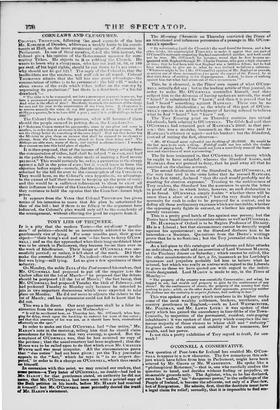CORN-LAWS AND CLE RGY M E N.
COLONEL THOMPSON, following t:fie good example or the late Mr. Kintner' of Dundee, addresses a weekly letter to his consti- tuents at Hull, on the more prominent suNects of discussion in Parliament. In one of these epistles, dated the 10th instant, the Colonel givi s Ids opinion of the Goveinment measure for com- muting, Tithes. He objects to it as rabting the Church. He wints to learn why a clergyman, who has rereired SO, 90, or 100 per cent. of his legal rights, should be cut down to 75 per cent.— why should not he get 125? The reply of the Colooel is, that the landholders are the masters, and will rob us all round. Colonel THOMPSON admits that the bill has one great advantage—the commutation of tithes i4 to be permanent : the bill will " make a clean sweep of the evils which tithes indict on the country by repressing its production :" but there is a drawback—" a fee: ful drawback"— " The tithe is to be commuted, not into a permanent payment in anoney, but into a permanent payment of so many plat tets of COM or the v dile thereof. And what is the effect of this ? Manifestly to attach the interests of the clergy for ever and for ever to the conservation of tho Corn laws. A clergyman is to receive anuually the value of, sty 100 quarters of corn. If tnt IM at 80 shillings a quarter; he is to have 400/. a year ; and if it is at :20 shilliogs, to have 1001."
The. Colonel then asks the parsons, what will become of them should the people succeed in putting dosei the Corn-laws ?— III" Robinson Crime stowed his gunpowder, some in one Ware and same in another, in coder that at all events it should not be all blown up at once. Had not the clergy better do something of the same kind ? lird not they better beg the Mieistry to give them an income that shall be callused to no chmee or change, from the Corn-laws being altered or feom their being not? The Bishops are able men, many of them, and capital mathematicians : 1 wonder they cannot see into this brief piece of algebra."
It bi then proposed, that of the income of the clergy arising from the commutation of tithes, half shall be lodged " in corn, and half in the public funds, or some other mode a making a fixed money payment." This would certainly be, so far, a protection to the clergy against a fall in the price of corn: but it would leave in force the objection before urged—namely, that the interests of the clergy are attached by the bill for ever to the conservation of the Corn-laws. They would have, on the Colonel's own hypothesis, an advantage to the extent of half their income in keeping up the price of corn; and this would be a sufficient inducement to them to exert all their influence in favour of the Corn-laws,—always supposing that they continue to hold the op:nion that the Corn-laws insure high prices.
It appears from the Votes that Colonel THOMPSON has given notice of his intention to move that his plan be substituted for that of the bill : but if there is no fallacy in the argument here indicated, the Colonel's plan would only add to the complexity of the arrangement, without effecting the good he expects from it.


























 Previous page
Previous page